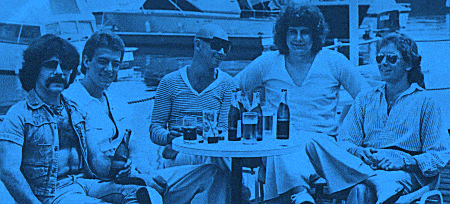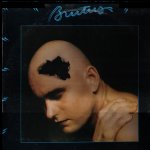 They took their name from the historical Roman who stabbed Julius Ceasar, and Zwolinksi shortened his name to Zwol. After a few weeks of practice they were being booked in the smaller clubs around the local circuit. That quickly mushroomed, and they found themselves touring the country and eastern US – opening for the likes of The Guess Who and The Staccatos, and even headlined a show with Chicago Transit Authority (who later shortened their name to simply Chicago) at the University of Waterloo in 1970. By this time Wilson was now acting solely as the band’s agent, and they were signed to a deal with Quality Records that fall. They released a string of singles on Yorkville Records over the next few months – “Funky Roller Skates,” “Duck Pond,” and “Help Me Free Me.” But by the summer of ’71 the group was falling apart at the seams. Zwol eventually reinvented the group while several members came and went. Now the jeans and satin shirts were replaced with glitter, makeup and jumpsuits. The glam look was an effort to mirror the bigger British acts of the day, such as David Bowie, Sweet and Gary Glitter. The new shtick gave them enough of an edge that they even headlined a sold out performance at Toronto’s Ontario Place. Within two years while the band grew, it was also streamlined – to Zwol, guitarist Gino Scarpelli (later of Goddo, Dennis Pinhorn on bass, and Lance Wright on drums. A heavier sound than before was setting them aside from alot of the other groups on the circuit, but the band’s onstage antics were also getting them into trouble, and they were banned in several Toronto high schools. Zwol was also arrested at one point in North Bay, Ont and was even slammed publicly for supposedly worshipping the devil. Another lineup shakeup shortly after left Zwol and Pinhorn with new guitarist Woody West, drummer Danny Smith, and Frank Ludwig on keyboards. They landed a deal with GRT Records in late ’75 and were hooked up with famed producer Jack Richardson (The Guess Who), laying down some tracks at Nimbus 9. “(Let Me Down) Slow and Easy” b/w “Tonight Tonight” was released as a single, but creative differences between Zwol and Richardson on where the recordings were going led to the sessions being scrapped. The lone exception was “Ooh Mama Mama,” which was released as the follow-up single that fall. It became a hit and cracked the Top 10 in both the Toronto and the Montreal markets, and battled The Bee Gees’ “Nights On Broadway” and The Eagles’ “One Of These Nights.” The song was also named Best Canadian Single of that year by The Montreal Star. Management at GRT however was still inspired by all the hype, and whisked them off to Tempo Studios in Toronto with producer Ralph Murphy (April Wine) to rework the recordings. With the lineup now consisting of Zwol, Smith, West, and new members Doni Underhill on bass and Laurie Del Grande on keyboards, three long and arduous days in the studio with a limited budget culminated in “Who Wants To Buy A Song” being released as a faltering single. The band’s self-titled debut album hit the stores in November of ’76. “Ooh Mama Mama” was included as the lead off track to an album full of tight hooks and slick solos of straight out rockers and melodic keyboard-oriented pop – not the band’s notorious theatrics and gimmicks translated to vinyl that many critics expected. Gigs around Ontario and Quebec and stateside continued, and the band found themselves on the undercard of Boston and Peter Gabriel concerts while “Sailing” b/w “Search For Tomorrow” followed suit as a single. Although critically acclaimed, it too failed to make a dent in the charts. The lineup continued to change over the next year or so, and included Chris Brockway (formerly of Pepper Tree) replacing Underhill on bass, who’d left to join Trooper. Brockway was in turn replaced by former Chimo, Motherlode and Studebaker Hawk veteran Breen LeBoeuf. Smith left the drum kit and was replaced by Moxy‘s Bill Wade. West was eventually replaced on guitars first by Paul Dean, (Scrubbaloe Caine, Streetheart, Loverboy), and then Jerry Doucette. Following the band’s final curtain call, LeBouef would go on to form Offenbach and would later join April Wine. Zwol would go on to a relatively successful solo career that spanned two albums, then start a new project The Rage, which released one album. After working briefly at Attic Records, he formed Naked Brunch which toured but never recorded. Brutus’ only album was remastered and re-released by Bullseye Canada in 2000, and also contained three bonus tracks – the single “Let Me Down Slow And Easy,” “Ride Cowboy Ride” (the b-side to “Ooh Mama Mama”) and the previously unreleased “King Of The World.”
|











